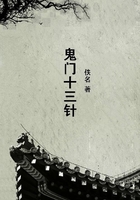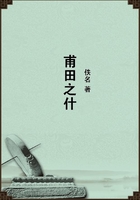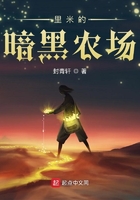Fortune was with Caesar. He succeeded in setting fire to the Egyptian fleet. Incidentally the sparks of the burning vessels fell on the roof of the famous library of Alexandria (which was just off the water front,) and destroyed it. Next he attacked the Egyptian army, drove the soldiers into the Nile, drowned Ptolemy, and established a new government under Cleopatra, the sister of the late king. Just then word reached him that Pharnaces, the son and heir of Mithridates, had gone on the war-path. Caesar marched northward, defeated Pharnaces in a war which lasted five days, sent word of his victory to Rome in the famous sentence "veni, vidi, vici," which is Latin for "I came, I saw, I conquered," and returned to Egypt where he fell desperately in love with Cleopatra, who followed him to Rome when he returned to take charge of the government, in the year 46. He marched at the head of not less than four different victory-parades, having won four different campaigns.
Then Caesar appeared in the Senate to report upon his adventures, and the grateful Senate made him "dictator" for ten years. It was a fatal step.
The new dictator made serious attempts to reform the Roman state. He made it possible for freemen to become members of the Senate. He conferred the rights of citizenship upon distant communities as had been done in the early days of Roman history. He permitted "foreigners" to exercise influence upon the government. He reformed the administration of the distant provinces which certain aristocratic families had come to regard as their private possessions. In short he did many things for the good of the majority of the people but which made him thoroughly unpopular with the most powerful men in the state. Half a hundred young aristocrats formed a plot "to save the Republic." On the Ides of March (the fifteenth of March according to that new calendar which Caesar had brought with him from Egypt) Caesar was murdered when he entered the Senate. Once more Rome was without a master.
There were two men who tried to continue the tradition of Caesar's glory. One was Antony, his former secretary. The other was Octavian, Caesar's grand-nephew and heir to his estate. Octavian remained in Rome, but Antony went to Egypt to be near Cleopatra with whom he too had fallen in love, as seems to have been the habit of Roman generals.
A war broke out between the two. In the battle of Actium, Octavian defeated Antony. Antony killed himself and Cleopatra was left alone to face the enemy. She tried very hard to make Octavian her third Roman conquest. When she saw that she could make no impression upon this very proud aristocrat, she killed herself, and Egypt became a Roman province.
As for Octavian, he was a very wise young man and he did not repeat the mistake of his famous uncle. He knew how people will shy at words. He was very modest in his demands when he returned to Rome. He did not want to be a "dictator."
He would be entirely satisfied with the title of "the Honourable."
But when the Senate, a few years later, addressed him as Augustus--the Illustrious--he did not object and a few years later the man in the street called him Caesar, or Kaiser, while the soldiers, accustomed to regard Octavian as their Commander-in-chief referred to him as the Chief, the Imperator or Emperor. The Republic had become an Empire, but the average Roman was hardly aware of the fact.
In 14 A.D. his position as the Absolute Ruler of the Roman people had become so well established that he was made an object of that divine worship which hitherto had been reserved for the Gods. And his successors were true "Emperors"--the absolute rulers of the greatest empire the world had ever seen.
If the truth be told, the average citizen was sick and tired of anarchy and disorder. He did not care who ruled him provided the new master gave him a chance to live quietly and without the noise of eternal street riots. Octavian assured his subjects forty years of peace. He had no desire to extend the frontiers of his domains, In the year 9 A.D. he had contem- plated an invasion of the northwestern wilderness which was inhabited by the Teutons. But Varrus, his general, had been killed with all his men in the Teutoburg Woods, and after that the Romans made no further attempts to civilise these wild people.
They concentrated their efforts upon the gigantic problem of internal reform. But it was too late to do much good. Two centuries of revolution and foreign war had repeatedly killed the best men among the younger generations. It had ruined the class of the free farmers. It had introduced slave labor, against which no freeman could hope to compete. It had turned the cities into beehives inhabited by pauperized and unhealthy mobs of runaway peasants. It had created a large bureaucracy--petty officials who were underpaid and who were forced to take graft in order to buy bread and clothing for their families. Worst of all, it had accustomed people to violence, to blood-shed, to a barbarous pleasure in the pain and suffering of others.
Outwardly, the Roman state during the first century of our era was a magnificent political structure, so large that Alexander's empire became one of its minor provinces. Underneath this glory there lived millions upon millions of poor and tired human beings, toiling like ants who have built a nest underneath a heavy stone. They worked for the benefit of some one else. They shared their food with the animals of the fields.
They lived in stables. They died without hope.
It was the seven hundred and fifty-third year since the founding of Rome. Gaius Julius Caesar Octavianus Augustus was living in the palace of the Palatine Hill, busily engaged upon the task of ruling his empire.
In a little village of distant Syria, Mary, the wife of Joseph the Carpenter, was tending her little boy, born in a stable of Bethlehem.
This is a strange world.
Before long, the palace and the stable were to meet in open combat.
And the stable was to emerge victorious.















